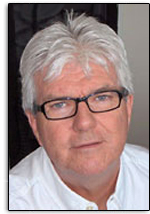Comparing human interaction to that of a frog in boiling water explains why climate disruption might just be our very own pot of boiling water. Venture capitalist, entrepreneur, engineer, and philosopher Tom Rand explains below our stasis in the face of one of the most fundamental problems of our time.
It is as much about solutions as it is an account of our present paralysis.
Our frog isn't moving much, but it's not yet paralysed. The pot is hot and will get hotter, but it's not yet boiling. We can still act, but time is running short. There are two ways this story can end.
In one, we continue with business as usual. We remain in blissful ignorance, enjoy the wealth we have created, and ignore for as long as possible the buildup of carbon and our increasingly unfriendly weather. We continue to order takeout and watch crazy storms and droughts on the Weather Channel. We feel badly for the people paddling in little boats down what was once their street or sitting forlornly in a dusty field. Maybe we start to notice something's wrong by a sudden spike in the price of pizza that arrives at our front door, caused by simultaneous droughts in the U.S., Australia, and Russia that dry up global grain markets. By then it's too late.
At that point we can only hunker down as best we can while the grandmother of storms and the granddaddy of droughts hit us again and again, without end. Our economy will be stretched to the limit as we try to adapt: we build sea walls, new bridges, more towns and, most importantly, figure out new ways and places to grow food. This story is a dystopia. Our way of life doesn't survive the century. Not the best choice - we'll all agree in retrospect! - but it's the one we're already making by not consciously, and determinedly choosing a different future. This story is our default because it's the decisions we make now that set our course for many decades, if not centuries, to come. And the party's already started. Hurricanes Katrina and Sandy, the deep droughts in the U.S., Pakistan, and Russia, the disappearing Maldives - these are but opening acts for the main event.
This bleak dystopia is not just my opinion. It's the view of some of our largest, most trusted, and conservative institutions: the Pentagon, PricewaterhouseCoopers (PwC), NASA, the International Energy Agency, and a host of others. If you prefer the "don't worry be happy" message, I doubt there's much anyone can do to convince you otherwise.
On the other hand, we might slow the warming and squeak our way through to a slightly warmer place, but at least it will be one that continues to support civilization.
A new story would start today. While pundits on Fox keep up the charade that the science isn't settled, public opinion quietly shifted. It started with Hurricane Sandy hitting Wall Street and was followed by the President's appeal to common sense. Then pieces started fitting together. Evidence of a burning Australia, melting Arctic, dried-out Canadian Prairies, flooded Calgary and Toronto, and decimated American cattle herds break through our collective cognitive defences. Deniers begin to look downright silly. Church leaders start speaking of a new responsibility to God's green Earth.
Let's look at a possible Great Global Drought of 2016 that changes everything when grain prices skyrocket around the world. Food prices escalate, and our farming sector collapses. Even in North America, many grocery shelves are empty, rice imports having been stopped as governments across the globe scramble to feed their own people. Food riots lead to very different results at the ballot box. Business leaders are forced to explain to a frightened and angry public what they are doing to solve the problem. Those with a track record on climate action double their market share overnight. Those who have exacerbated the problem see their revenues plummet. People vote for action as the ballot box and with their pocket books. No longer do vested interests fight strong climate law.
Now, imagine it's 2020 Packaged goods have a carbon footprint labelled beside the bar code. Supply chains have responded Walmart Style' to the demands of large retailers, bringing a lowered carbon footprint to their customers' loading dock. Pension funds have acknowledged they can't meet future obligations in a hotter world and have begun pouring trillions of dollars of long-term money into low-carbon infrastructure. The moribund economy of the developed world bounces back as the massive stimulus effect kicks in.
There are economic casualties Share prices of fossil fuel companies, historically based on proven reserves, nose-dive as investors realize those profits have to be left in the ground. Those prepared for the shift and willing to move quickly, evolve into clean-energy companies and regain market share. Their employees take advantage of pension-fund-backed retraining programmes to full the huge gap of skilled trades. Others see their coal plants shuttered and revenues dry up. The lawsuits brought by angry CEOs are thrown out of court on the basis that they should have made themselves aware of the carbon risk a decade earlier.
By 2040 we will have averted the worst of it and squeaked through by limiting warming to three degrees Celsius. A new and sustainable relationship between our energy systems and the planet opens the possibility of another thousand years of civilization. Where that takes us, nobody knows.
This imagined scenario is not quite a utopia, especially if you happen to be a coalminer or shareholder of fossil fuel stocks. But this story ends with a chance at more looks at where we are and where we are headed. How we get there remains to be seen.
We know why we are paralyzed. From the siren song of denial to economic models that discount the future and simplify the science and a free-market ideology threatened by climate disruption to the conservative tendencies of capital of capital and our economic elite. Our paralysis is more than a bunch of bad guys rigging the game - the rules of the game itself are predisposed to ignore climate disruption. Now that we can see how those rules operate, we can work to change them and tilt the odds in favour of action.
We start by silencing the siren song of denial…1
1 Tom Rand. "Waking the Frog-Solutions for Our Climate Change Paralysis" ECW Press (2014): 173-176





